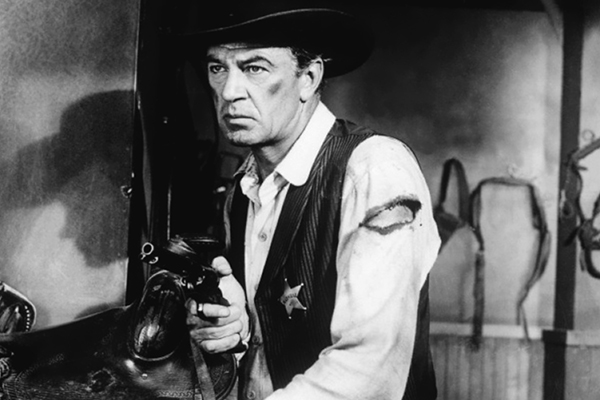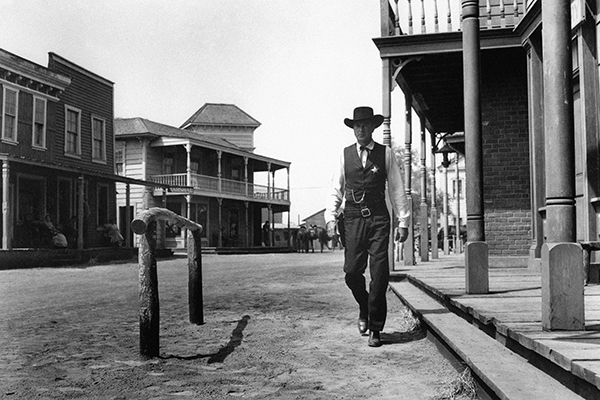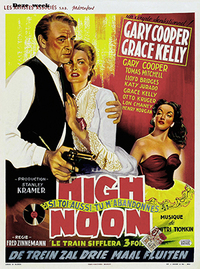The countdown
Gary Cooper, alone against all
POSTED ON 14.10.2024
An atypical Western and an authentic masterpiece, is High Noon a blistering political critique of McCarthyism? Let’s investigate.

High Noon by Fred Zinnemann (1952) © DR
It's a western unlike any other, shot in black and white, bordering on a documentary style (“The images should look like newsreels from the time, if there had been any...” said director Fred Zinnemann), the camera zooms in for a close-up of a lone man, emphasising his fatigue and sweat. He wanders through a deserted city, looking for help to either lay down justice or die. High Noon (technically exactly midday), is a masterpiece of dramatic tension and a churning turmoil of thoughts (the essential motif of the director's entire œuvre), reinforced by a real-time narrative, where shots of the clock signal a frightening countdown.
Who was the genius behind High Noon? Screenwriter Carl Foreman, who came up with the idea for this almost cloistered drama, realised that it was similar to a short story by John Cunningham, so he bought the rights from the latter. Foreman had purchased shares in Stanley Kramer's production company, and the two men dreamt of making movies that were more realistic than the ubiquitous Hollywood fables, for an audience they felt had achieved ‘post-war adulthood’. It was a credo shared by Fred Zinnemann, who, acting on their suggestion, directed The Men, about the fate of paraplegic soldiers returning from the front (for which Foreman was nominated for an Academy Award in the category of Best Screenplay).

High Noon by Fred Zinnemann (1952) © DR
Foreman ploughed on with the script for his western, which he handed in at the end of June 1951. But something happened just before shooting: Foreman was summoned by the House Committee on Un-American Activities (HCUA), the armed wing of McCarthyism. Foreman believed what he was experiencing was a result of the betrayal of some people and the cowardice of others, leaving him feeling alone in the face of something more powerful than himself, and there was a parallel with what his character was going through. Foreman added to the dialogue, for example in the scene where Gary Cooper goes to the church where the village notables are gathered. Concerning his own case, he was not being paranoid; Kramer was trying to fire him. Even though Foreman was not on the notorious ‘Hollywood ten’ list, and his dalliance with communism had been brief, the producer didn’t want to be accused of giving work to ‘America's enemies’. Foreman ultimately was able to save his own neck because he was a shareholder in the production company.
Upon release, the film did not escape the anti-communist hysteria that was spreading across America in those years, and it sparked some debate, at least among the conservative press, but it triumphed at the box office, reaching number 3 in 1952. It owed its success to Gary Cooper, who won an Academy Award for his role in the film, and who was not known for his progressive views (which did not prevent him from always supporting Foreman). Even the theme song, ‘Do not forsake me, oh my Darlin’, composed by Dimitri Tiomkin, literally summed up the plot, a neat device that has remained quite rare, but it fell short in the French version (‘If you abandon me too’).
Fred Zinnemann has always contested the interpretation that High Noon is an allegory against McCarthyism: ‘If it's a subversive Western, then its subversion may not be political, it might be an unconscious attitude of those who wish to see the classic myth of the brave Western hero under attack, the superman who is invariably victorious.” At the same time, his films have always advocated resistance to all forms of fascism and totalitarianism. In High Noon, the threat was often represented by shots of rails, foreshadowing imminent danger. These repeated shots immediately conjured up other images, the terrible ones of the railway tracks leading to the concentration camps... Yes, this is definitely a Western unlike any other.
A.F.

Screenings:
High Noon by Fred Zinnemann (1952, 1h25)
Pathé Bellecour Mon. 14 at 2.30 pm | Cinéma St-Denis Tue. 15 at 8.30 pm |
Institut Lumière (Hangar) Thu. 17 at 3.30 pm | UGC Confluence Fri. 18 at 11.15 am |
Comœdia Sun. 20 at 5.00 pm

